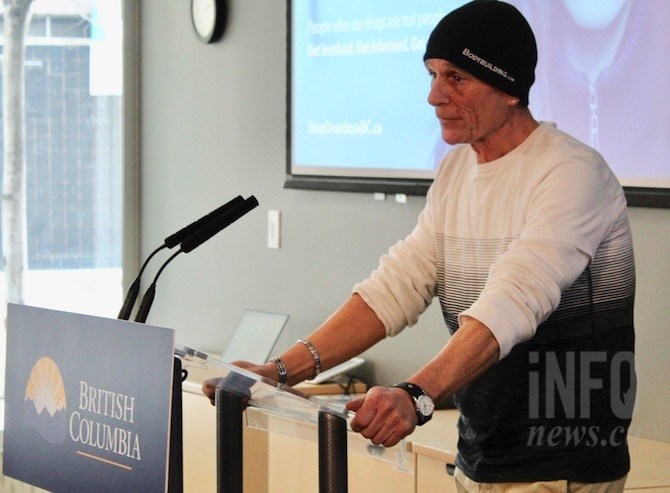
Andrew Leaking spoke at an Interior Health Authority press conference in Kelowna, Friday, Feb. 8, 2019.
(ROB MUNRO / iNFOnews.ca)
February 08, 2019 - 3:35 PM
KELOWNA - Andrew Leaking is living proof that programs to help drug addicted homeless people really do save lives.
“I’m one of those guys you see in the alley – pondering death and wondering if I deserved to live,” he said at an Interior Health press conference today, Feb. 8.
Two years ago, he became addicted to opioids and it was only through contact with Andrew Kerr at Kelowna’s mobile overdose protection unit that he started to turn things around.
“Andrew and I became friends due to the fact that he doesn’t know how to level a bus,” Leaking eventually joked, referring to the motor home used by the mobile unit. That only came after he choked up while talking about what he went through on the streets where he saw nine others die.
He talked about being in a state where he really didn’t care about living or dying and how small things done by Kerr and the nurses he came into contact with made him realize he had to do things differently. Now he’s using an opioid replacement and has supportive housing as he continues on his journey to be the “superman” his eight-year-old daughter believes him to be.
Today's press conference was called to announce the expansion of Interior Health’s opioid replacement program from weekdays to evenings and weekends, doubling its capacity.
Called an opioid agonist therapy, it provides opioid replacements that allow recipients to get away from the harmful street drugs without suffering the ravages of withdrawal.
Judy Darcy, the province’s Minister of Mental Health and Addictions, stressed that there’s no one solution to the opioid crises that took about 1,500 lives in B.C. in each of the last two years, including 232 in the Interior Health region last year.
Those people came from all walks of life, she noted. It’s not just a problem for the homeless. Overcoming the stigma of drug addiction is a vital part of dealing with the opioid crisis.
She talked about the many different “tools” to support drug users on their “Pathway to Hope.” Those tools include the mobile units, the opioid agonist therapy, safe needle disposal unit, supportive house and more.
Darcy said that a study done by the B.C. Centre for Disease Control found the province’s efforts saved 4,700 people from overdose deaths.
To contact a reporter for this story, email Rob Munro or call 250-808-0143 or email the editor. You can also submit photos, videos or news tips to the newsroom and be entered to win a monthly prize draw.
We welcome your comments and opinions on our stories but play nice. We won't censor or delete comments unless they contain off-topic statements or links, unnecessary vulgarity, false facts, spam or obviously fake profiles. If you have any concerns about what you see in comments, email the editor in the link above.
News from © iNFOnews, 2019